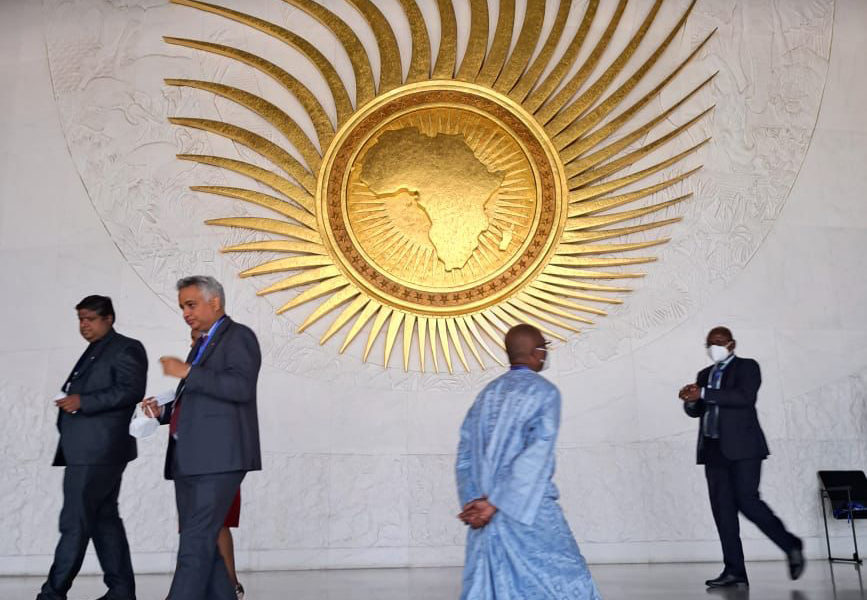News
AU resolution against Israel ‘nonsensical and one sided’

A blatantly biased and anti-Israel resolution was passed almost unnoticed at the African Union (AU) summit in Addis Ababa, Ethiopia, just days after the forced removal of a senior Israeli diplomat grabbed headlines last month.
The five-page draft statement of this resolution blames Israel entirely for the Israeli-Palestinian conflict. The statement calls on all AU member states not to “recognise the status that Israel has established in the Palestinian and Arab territories, including East Jerusalem, which perpetuates the system of colonialism and apartheid”.
It also calls on them to “end all direct and indirect trade, scientific, and cultural exchanges with the state of Israel” and pushes for Israel to be brought before the International Court of Justice.
It was passed in spite of Israel having been recognised by 84% of Africa’s states and having made solid progress in bilateral collaboration with Africa countries. However, the language used in this statement shows how far Israel still has to travel to win over the continental body.
The draft statement is part of the AU’s 86-page “Decisions, Declarations, Resolutions and Motions” document, the final version of which has not yet been circulated. This is known to take weeks or more to happen, but there are seldom major changes made.
The “Draft Declaration on Palestine and the Middle East” was tabled at the summit, according to an AU insider. “Yes. It was discussed. Every year it’s the same thing – the declaration on Palestine. It wasn’t discussed much. It’s a standalone agenda item of the African Union,” the source confirmed.
The draft statement expresses “full support for the Palestinian people in their legitimate struggle against the Israeli occupation, represented by the Palestine Liberation Organization [PLO] under the leadership of President Mahmoud Abbas, in order to restore their inalienable rights, including the right to self-determination, return of refugees, and independence in their state of Palestine existing side by side with the state of Israel”.
It rejects Israeli settlements, and calls on AU members to “refrain from any action that would undermine the principles of solidarity with the Palestinian people”, perhaps an oblique reference to the Abraham Accords that normalised Israeli relations with four Muslim-majority countries.
It calls for an end to “continued desecration and attempts to Judaise the Islamic and Christian holy sites … in an effort to create a single racist state that promotes religious intolerance”. It also lauds Algeria and Egypt for efforts to unify feuding Palestinian factions under the PLO umbrella.
According to Professor Hussein Solomon from the University of the Free State, “This AU resolution isn’t going to fly, and it doesn’t even make sense. I find it interesting in terms of cutting off ties with Israel. Forty-six African countries have relations with Israel. Chad just opened its embassy outside Tel Aviv.
“In many ways, Algeria is the outlier,” Solomon said, “and has been with South Africa in various attempts to block Israel in terms of its observer status.” He said land grabs and attacks by settlers alongside Israel’s new right-wing government set back any peace process.
Terence Corrigan, project manager at the Institute of Race Relations, said, “What we’ve got here is essentially a narrative in which all blame and fault are apportioned to Israel. It’s very much in the historical line of the AU being an anti-colonial body. The danger – and we see this all the time in South Africa – is that the situation in and circumstances of the Middle East and Israel/Palestine are filtered through an inapplicable set of assumptions.
“The sense of Israel as an illegitimate colonial presence in the region comes out strongly in the references to ‘Judaising’ religious sites,” Corrigan said. “Religious impulses contribute to making the conflict so damnably intractable – no tradition has been exempted from that in this part of the world, not historically and not now. Certainly, Jews could make the same claim about a number of sites … I’d say that dismissing competing claims in this way only contributes to hardening positions.”
There’s nothing in the document “that recognises any legitimate Israeli security concerns, such as rockets flying in from Gaza”, Corrigan said. “Interesting too is that it presents the Palestinian population as a political monolith under Mahmoud Abbas. This is ludicrous, given the prominence that Hamas has assumed, so much so that even South Africa and the African National Congress (ANC) have been courting the latter.
“Perhaps the most interesting thing about this is whether anyone really takes this seriously. It calls for what amounts to a complete freeze on all ‘direct and indirect trade, scientific, and cultural exchanges’ with Israel. This is a ridiculous proposition, since Israel’s reach in Africa has probably never been more extensive.”
Benji Shulman, the director of public policy at the South African Zionist Federation (SAZF) said, “The draft declaration was tabled without any further reference to it, and appears similar to those that have been submitted every year to date. The SAZF maintains that Israel’s participation in the AU continues to benefit the continent in a number of innovative ways, and calls on the ANC government to end its obsessive campaign against Israel’s observer status in the regional body.
“Logically, Israel’s participation within the organisation is simply an extension of what’s happening at bilateral level between member states and Israel as Africa-Israel relations continue to yield increasing levels of economic co-operation between countries.
“The same applies to South Africa, with several Israeli non-profit organisations recently concluding solar, water, and technology-based projects in our country. These have provided clean running water, renewable energy, and access to technology for thousands of citizens and students,” said Shulman.
While it says little that’s new – and much that’s familiar from South African government statements – this document makes it plain that Israel still has much to do for the success of its African charm offensive.

yiyzchak
March 3, 2023 at 6:21 am
was there running water after the motion was passed?